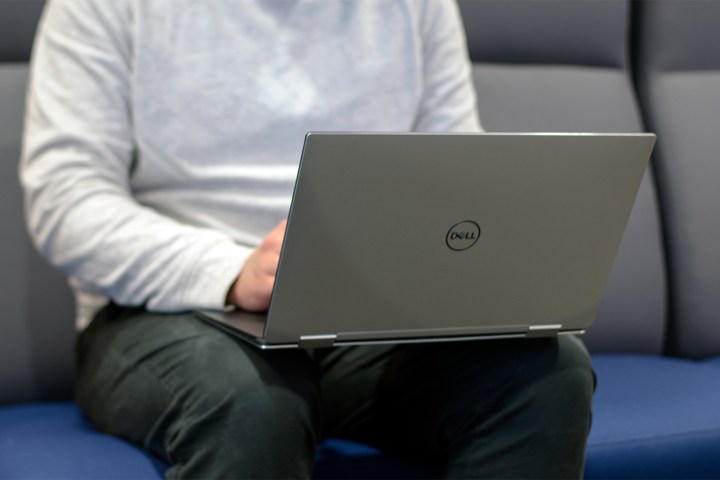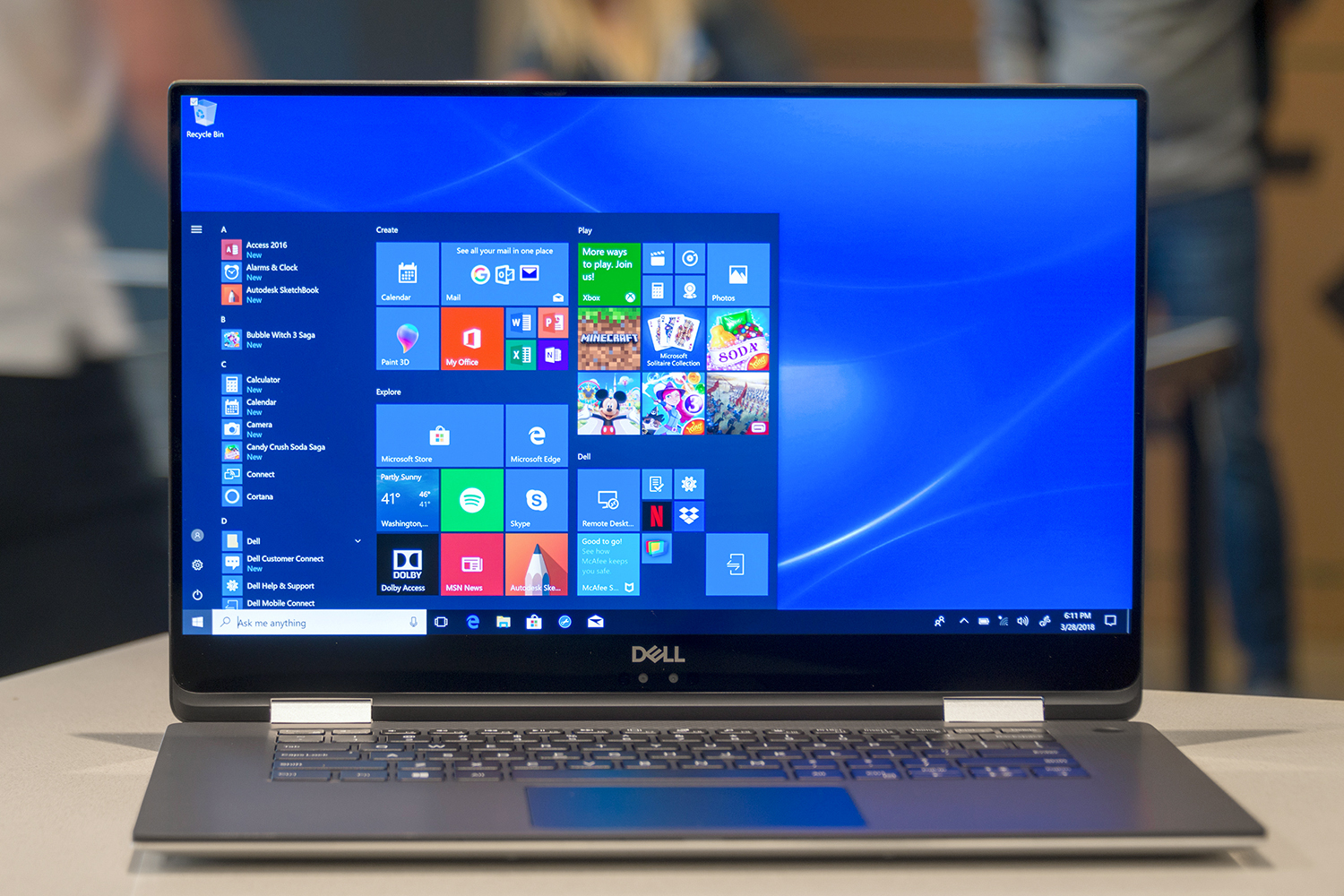
Dell makes some of our favorite laptops and the new XPS 15 is one of them. More graphically powerful than the (arguably) best laptop in the world, the XPS 13 and with a larger display, it offers a lot to prospective buyers. But it doesn’t have a 360-degree hinge. Its 2-in-1 cousin does though and that’s not the only difference between the two.
In this head to head, we’ll pit the Dell XPS 15 2-in-1 vs. Dell XPS 15 to see whether it’s better to have a laptop that can turn into a tablet, or enjoy some of the upgraded hardware of Dell’s newly refreshed XPS 15.
Specifications
| Dell XPS 15 2-in-1
|
Dell XPS 15 2018 
|
|
| Dimensions | 13.9 x 9.2 x 0.63 inches (0.36 at thinnest) | 14.1 x 9.3 x 0.66 (0.45 at thinnest) |
| Weight | 4.3 pounds | 4.0 – 4.5 pounds |
| Processor | 8th Generation Intel Core i5, i7 Kaby Lake G | 8th Generation Intel Core i5, i7, i9 |
| RAM | 8GB or 16GB (32GB planned) | Up to 32GB |
| Graphics | Radeon RX Vega M GL | Intel HD 630, Nvidia GTX 1050 or 1050 Ti |
| Display | 15.6-inch LED-backlit IPS display | 15.6-inch IPS |
| Resolution | 1080p or 4K | 1080p or 4K |
| Storage | 128GB, 256GB, 512GB, 1TB PCIe SSD | 1TB HDD, 1TBSSHD. 128GB, 256GB, 512GB, 1TB PCIe SSD. |
| Networking | 802.11ac, Bluetooth 4.1 | 802.11ac, Bluetooth 4.1 |
| Ports | 2 x Thunderbolt 3, 2 x USB-C 3.1, SD card reader, headset, Noble lock | USB-A 3.1 x 2, Thunderbolt 3, HDMI 2.0, SD card reader, headset |
| Webcam | 720p widescreen HD | 720p webcam |
| Operating System | Windows 10 | Windows 10 |
| Battery | 75 watt-hours | 56 watt-hours, 97 watt-hours |
| Price | $1,500+ | $1,000+ |
| Availability | Now | May |
| Review | 3.5 out 5 stars | The 2017 model |
Design
Although Dell has made some major strides to update and improve the XPS ‘look’ with its latest refresh of the XPS 13, the XPS 15 range is much more uniform. Built a little more for function over form, they’ve been traditionally good looking pieces of kit, but nothing overly eye catching. That’s the case with both the recently released XPS 15 2-in-1 and the newly announced 2018 version of the XPS 15.
Both sport the silver aluminum outer-casing that is typical of most laptops in the XPS range, with the black, carbon-fiber interior. They both sport underslung 720p webcams and the same slimline bezels, with much the same weight and dimensions.
The biggest design difference between the two though, is the hinge. Where the XPS 15 might have a little back and forth give to it, its 2-in-1 counterpart is designed to flip all the way through 360-degrees, turning into a tablet at a moment’s notice. It can also operate in tent mode for media viewing as required. That’s a level of functionality that the XPS 15 just cannot match.
There’s a little disparity in connectivity too. Where the wireless solutions are identical in both laptops, the XPS 15 sports a pair of legacy-supporting USB-A 3.1 ports, alongside a newer Thunderbolt 3 connector. It also has an HDMI 2.0 output for connecting up an external display and a full SD card reader alongside its headphone jack. The XPS 15 2-in-1, on the other hand, goes all in on USB-C, offering two 3.1 ports and a pair of Thunderbolt 3 supporting ports also. It too has an SD card reader and headphone port, as well as a Noble lock for security purposes.
The keyboard on the XPS 15 is one we’ve liked for a couple of generations and never feels tiresome to type on. The XPS 15 2-in-1 on the other hand isn’t as pleasurable to type on, especially for longer periods.
With both these laptops near-identical in most measures, whether you prefer one design over the other really depends on your use case. If you want a convertible laptop and don’t care for USB-A, then the 2-in-1 is better. If you don’t need a tablet mode, then the XPS 15’s keyboard and legacy port support are appreciated. It’s a toss-up.
Winner: Draw
Performance
The XPS 15 2-in-1 impressed us when it debuted as one of the first laptops to adopt the new Kaby Lake G chips that were built as part of the Intel/AMD team up. Performance from the Intel CPU with Vega graphics chip is solid, with great gaming potential and fast general processing that was easily comparable to other laptops with dedicated CPUs.
However, those numbers may well struggle to hold up to the new XPS 15. While we don’t have hands-on performance numbers for it just yet, its specifications suggest it could well set a new benchmark for 15-inch laptops. Entry level builds will utilize the four core Intel Core i5-8300H CPU with up to 32GB of RAM and Intel HD graphics, while the mid-range offering will up the ante to a Core i7 with six cores (and 12 threads) and a GTX 1050 graphics chip.
At the top end though, Dell has managed to pack a Core i9-8950HK CPU into the new XPS 15. It too has six cores and 12 threads, but can operate at up to 4.8GHz if well cooled enough. It’s paired up with a GTX 1050 Ti, which should offer a noticeable improvement in graphical performance over its predecessor’s GTX 1050.
So which is better? Well, it depends on what configurations you’re talking about. At the lower $1,300 configuration, you’ll most likely claim some gaming performance that outdoes an equally-priced XPS 15. On the higher end, though, the GTX 1050 Ti and Core i9 CPU will give you the performance edge.
Winner: Draw

Display
The XPS 15 2-in-1s display is one of our favorite features about it. Whether at 1080p or 4K, it remains bright and vibrant while you’re watching movies, playing games, or just browsing the web. Its color accuracy isn’t perfect, but it’s still one of the best displays overall that we’ve seen on a 15-inch laptop in years.
The XPS 15 is also slated to be quite the looker. Typically we’ve seen some great color accuracy out of XPS 15 laptops, so it may well pull ahead of the 2-in-1 when it’s released and with the same options for resolution, there’s unlikely to be much else to differentiate these two.
That said, touch-functionality will be missing from the new XPS 15 unless you opt for the 4K panel. That might be overkill if battery life is your main concern, but from our past experience, it’s hard to go back to a 1080p once you’ve used one of the beautiful 4K displays. The new XPS 15 4K panel is said to be more efficient too.
Winner: XPS 15
Portability
With both the XPS 15 2-in-1 and the XPS 15 evenly matched in weight and size, the biggest deciding factor for portability will be in the battery life of the two devices. The XPS 15 2-in-1 has a decent sized battery, but we found it massively impacted when having to power the 4K configuration of that convertible laptop.
The last generation XPS 15 also ran into problems there, though lasted a couple of hours longer than its 2-in-1 counterpart. The new-generation however, is said to sport a much less power-hungry panel, so should be more efficient. If you choose to not use the hard drive option, running an exclusively PCIexpress SSD storage solution, you can have the 97 watt-hour battery too, which Dell claims can go longer than 20 hours on a single charge.
Real world usage is unlikely to be quite as long and neither are expected to beat the class-leading Surface Book 2, but when combined with the new hardware, the XPS 15 should easily outlast the 2-in-1.
Winner: XPS 15
Pricing and availability
This is a tough category whenever you’re discussing pre-release hardware. On one hand, the XPS 15 starts at a much more competitive price point than the XPS 15 2-in-1 — especially considering its starting hardware option has newer hardware, with a Core i5 CPU that supports hyperthreading. But on the other, the newer version of the XPS 15 isn’t out yet and we don’t have full pricing information for the entire range of configurations.
Although it seems likely that the XPS 15 will be the more competitively priced hardware, the XPS 15 2-in-1 takes this category for now, by virtue of being available to purchase. You can always pick up the 2017 version of the XPS 15, though you’ll be getting an older generation CPU. If budget gaming performance is what you want, the lower configurations of the XPS 15 2-in-1 are your best bet.
Winner: XPS 15 2-in-1
It doesn’t all hinge on the hinge

Where you might assume that a comparison between laptops named the XPS 15 and the XPS 15 2-in-1 would mean that the biggest differentiating factor is the 360-degree hinge, it’s proved to be far more complicated than that. While both are stellar laptops — and one is a pretty decent tablet too — there are some substantial differences between them.
The XPS 15’s newer hardware is a real bonus, as it nets greater performance and improved energy efficiency. While it does lack some of the function of the 2-in-1, it sports a nicer keyboard and its battery life should keep you working (and even gaming) for longer. While we’ll need to see full pricing information and get our hands on the new XPS 15 to give a final judgement, even the older model is the laptop we’d recommend to more people.
Overall winner: XPS 15




